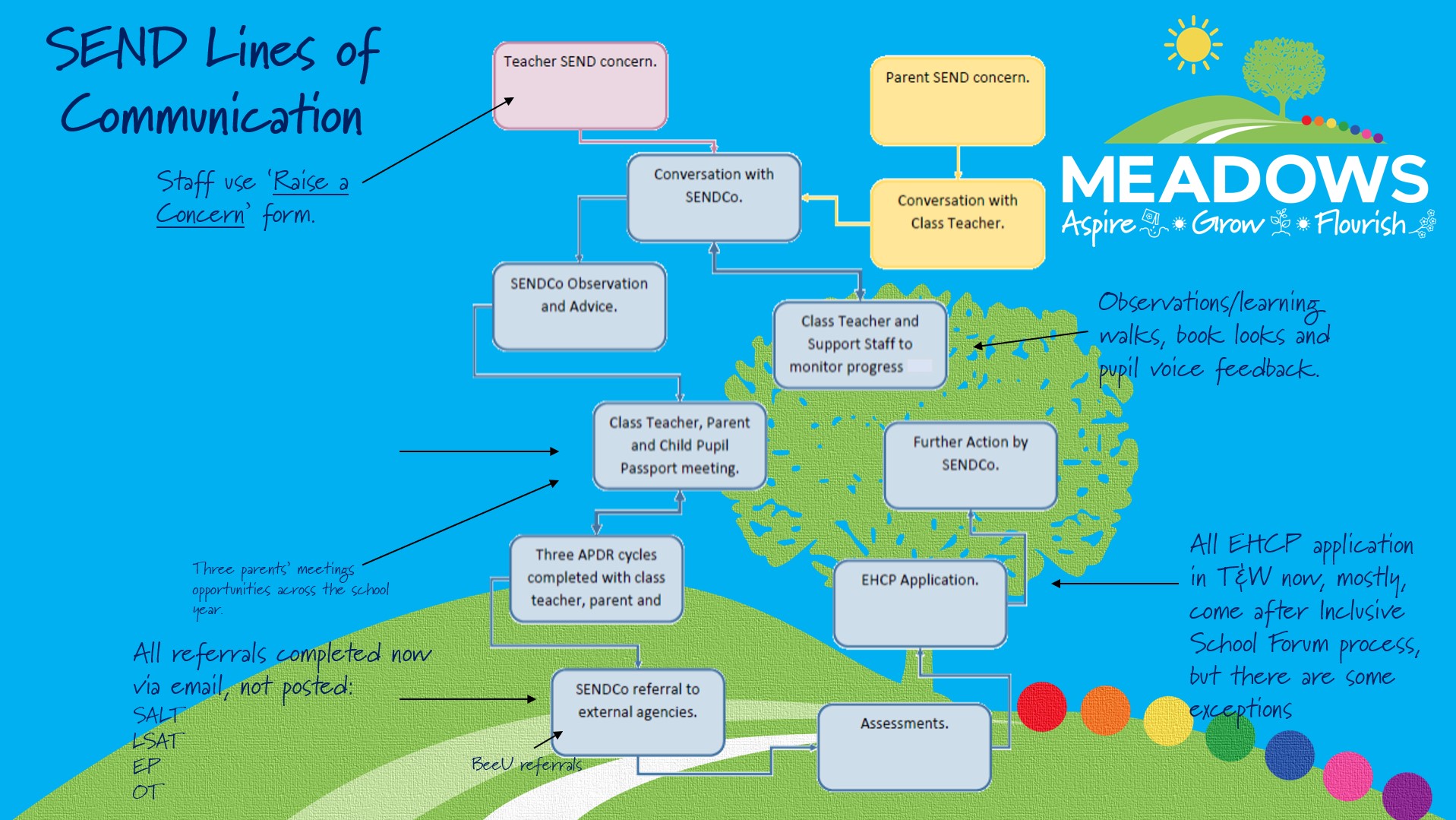Special Educational Needs & Disability Information
We believe it is every child’s right to achieve their full potential - to be able to aspire, grow and flourish and are proudly a school which has signed up to the Telford and Wrekin SEND Working Together Charter.
What is SEND?
SEND stands for 'Special Educational Needs and Disability'.
A child or young person may have SEND if they have challenges in learning or have a disability that means they need extra help in their education.
The intent, implementation and impact of SEND at Meadows
intent implementation and impact for send.pdf
What is a learning difficulty or disability?
A child of school age or a young person has a learning difficulty or disability if:
- Learning is much harder for them than for most others their age.
- They can’t use the same school resources as other pupils their age because of a disability that gets in the way.
What are the four areas of special educational need?
At Meadows Primary School and Nursery, we are unwavering in our commitment to ensuring that every child has the opportunity to aspire, grow, and flourish. We believe that a careful and thoughtful consideration of the four areas of special educational need and disability (SEND) is essential in understanding how best to support each child's unique learning journey. Our dedicated staff work tirelessly to create an inclusive environment where all children are nurtured and valued for their individual strengths and needs.
The Four Areas of Special Educational Need and Disability:
1. Communication and Interaction
Children with communication and interaction needs may experience difficulties in expressing themselves, understanding language, or interacting with others. This area includes children with speech, language, and communication needs (SLCN), as well as those with autism spectrum disorder (ASD).
At Meadows, we provide tailored support through speech and language therapy, social skills groups, and individualised communication plans. We also work closely with families and external specialists to ensure a holistic approach to each child's development.
2. Cognition and Learning
Cognition and learning needs encompass a wide range of learning difficulties that affect a child's ability to process information, acquire new skills, and achieve academic success. This includes children with specific learning difficulties (SpLD) such as dyslexia, dyscalculia, and dyspraxia, as well as those with moderate learning difficulties (MLD), severe learning difficulties (SLD), and profound and multiple learning difficulties (PMLD).
Our school employs a variety of teaching approaches, including differentiated instruction, multi-sensory learning techniques, and provision maps to target support. We also offer additional support through specialist interventions and small group work to ensure that each child's learning needs are met.
3. Social, Emotional, and Mental Health Difficulties
Children with social, emotional, and mental health (SEMH) difficulties may struggle with managing their emotions, forming positive relationships, and maintaining appropriate behaviour. This area includes children with conditions such as anxiety, depression, attention deficit hyperactivity disorder (ADHD), and conduct disorders.
At Meadows, we prioritise the well-being of our children by providing a nurturing and supportive environment. Our staff are trained in emotional literacy support, and we offer a range of interventions, including counselling, mentoring, and behaviour support plans. We also collaborate with external agencies to ensure comprehensive support for each child's mental health needs.
4. Sensory and Physical Needs
Sensory and physical needs refer to difficulties related to a child's physical abilities or sensory processing. This includes children with visual impairments (VI), hearing impairments (HI), and physical disabilities, as well as those with sensory processing disorders.
We are committed to providing an accessible and inclusive learning environment for all students. Our school facilities are equipped with necessary adaptations where necessary, to support children with physical and sensory needs. We also work closely with occupational therapists, physiotherapists, and other specialists to develop individualised support plans that address each child's specific requirements.
At Meadows Primary School and Nursery, we recognize that every child is unique and deserves the opportunity to thrive. By carefully considering the four areas of special educational need and disability, we are able to provide personalised support that empowers each child to reach their full potential. Our commitment to inclusivity and collaboration with families and specialists ensures that all children at our school are given the best possible start in life.
Is Meadows a Special Educational Provision?
At Meadows, we are committed to ensuring the inclusion of all of our children, however we are a mainstream Primary school, not a Special Educational Provision. A special educational provision is a provision that is different from or additional to that normally available to children of the same age, which is designed to help children and young people with SEN or disabilities to access the National Curriculum appropriately.
SEN Support for All
Each child is unique, and on their own educational journey. Sometimes your child may need extra help in class, but this does not necessarily mean they have special educational needs, we call this 'SEND Support'. Teachers in class will regularly check how well children are doing and look for anything that might be making it harder for them to learn. Teachers change how they teach to help each child individually.
Adjustments may include:
- Guide/prompt sheets for reading and writing.
- Working with a partner.
- Small group work with adult led instruction.
- Information presented in different formats.
- Pen grips/writing slopes, wobble cushion.
- Task planners.
- Teaching that focuses on next steps.
- Social stories.
- Explicit instruction from an adult. Steps can be presented in varied formats.
- Visual supports.
- Concrete resources in maths.
- Tactile objects/real references.
- Memory games.
- Breaking learning down into small manageable chunks.
- Environment adaptions.
- Emotional Literacy support.
- Coloured overlays.
- Different options for how to do work.
- Use of ICT.
If the strategies, with time, don't seem to be working, the graduated response is a way of making sure that the help and support given to your child are checked regularly to make sure it matches their need.
What the graduated response looks like:
- The school assesses your child and works out what they need.
- Then, we make a plan to help with their need.
- The school puts the plan into action. We do it!
- After a while, we review how well your child is doing and decides if they need more or different help.
Click here to view our Whole School Provision Map for SEND

My child has SEND - so should they have an EHCP?
An Education Health and Care Plan (EHCP) is an official document that talks about a child or young person’s special educational needs, the help they require and all the goals they want to reach.
Most children who are found to have SEND can get the help they need in school, without having to create an Education Health and Care Plan (EHCP). If extra resources/reasonable adjustments aren’t needed, then an EHC Plan might not be necessary, and the needs can be met with the regular funding that is assigned to a school (notional budget).
An EHCP doesn’t mean your child gets an adult with them all the time. Instead, it’s made to help your child become more independent and make progress on their own.
If you would like to discuss whether your child would benefit from, or could be applicable for an EHCP, please do get in touch with our SENDCo.
Following the submission of an EHCP, the timeline is as follows:

Click here to view Telford and Wrekin's EHCP Assessment Timeline
The Special Educational Needs and Disability Code of Practice (Chapter 9.16) allows Local Authorities to develop criteria for deciding whether to undertake a statutory assessment for an EHC plan. The criteria are flexible, adaptable and not applied as a blanket policy. Whilst the criteria are used to support decision making, each case is considered individually. At all times the local authority applies the statutory tests as described in section 36(8) of the Children and Families Act 2014 to determine the appropriateness of a request for an EHC assessment of need.
To view the EHCP Criteria for Telford and Wrekin, please explore the below four documents:
Sensory and Physical Early Health Care Needs Assessment Guidance
Social, Emotional and Mental Health Early Health Care Needs Assessment Guidance
Communication and Interaction Early Health Care Needs Assessment Guidance
Cognition and Learning Early Health Care Needs Assessment Guidance


